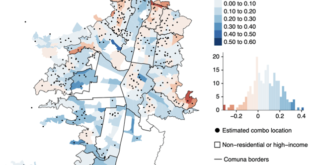Nearly every neighborhood in Medellín, Colombia, has a combo, or local street gang—almost four hundred in all. They earn most of their money from local drug sales. Some also run protection rackets, while others market legal goods—arepas, eggs, and even cooking gas—to locals. All these revenues make each Medellín neighborhood a valuable prize for combos to control. That competition for prime territory should be a recipe for violence. Yet the city has an annual homicide rate far...
Read More »The terrible trade-off: Why less violent cities often means more powerful and organized crime
[unable to retrieve full-text content]More than half the world lives in cities, and a lot of those cities (especially those in the Americas) are plagued with homicides and crime. Americans often think this violence is an individual problem: greed, passions, feuds, and hot reactive thinking drive killers. That’s true to an extent. But this view overlooks something important: that, […] The post The terrible trade-off: Why less violent cities often means more powerful and organized...
Read More » Heterodox
Heterodox

